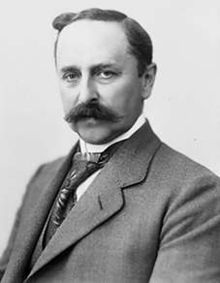Nils Edén
Nils Edén (born August 25, 1871 in Piteå , † June 16, 1945 in Stockholm ) was a Swedish historian , politician and Prime Minister of Sweden (Sveriges State Minister) .
Studies and professional career as a history professor
The son of a school principal completed school in Luleå from 1889 to study history at Uppsala University .
His doctorate to Philosophiae Doctor ( Ph. D. ) with a dissertation entitled The organization of the central government during the older Wasa era from 1523 to 1594 ( Om centralregeringens organization under den äldre Vasatiden 1523-1594 ) was awarded the Geijer Prize in 1899 excellent.
He was then appointed lecturer in 1899 and then in 1903 associate professor of history at Uppsala University. As such, he soon made a name for himself as a specialist in the history of Sweden in the 16th and 17th centuries. From 1909 to 1920 he was a full professor and holder of the chair of history at Uppsala University.
Political career
MP
As a lecturer, he began to deal with current political issues such as the union with Norway and the solution to the military question. In 1901, he also presented his students with an argument for the introduction of general conscription in order to replace the centuries-old and outdated military division system . In connection with this, he also spoke out in favor of the introduction of universal suffrage , which at the time was connected with the issue of the military question.
His actual political career began in 1908 when he was elected member of the Second Chamber (Andra kammaren) of the Reichstag , where he represented the interests of the Liberal Party (Frisinnade Landsföreningen) . In 1911 he became a member of the constitutional committee of the Reichstag.
Liberal parliamentary group and party leader
After Karl Staaff was elected Prime Minister in 1912, he was initially his successor as Chairman of the Liberal Party in the Second Chamber. After Staaff's death on October 4, 1915, he also succeeded him as chairman of the Liberal Collection Party, the predecessor of today's Liberals party .
As such, he represented the interests of the right wing of the party, especially in matters of defense policy, in contrast to the wing of the free church movements under the later Prime Minister Carl Gustaf Ekman .
Prime Minister from 1917 to 1920
After the Reichstag elections in 1917 , the previous liberal- conservative President of the Second Chamber and long-time District President of the Jämtland Province , Johan Widén , was charged with forming a government. After this failed to form a government, King Gustav V appointed Nils Edén as Prime Minister on October 19, 1917.
As such, he formed a coalition government of the Liberal Gathering Party and the Social Democratic Labor Party , whose chairman Karl Hjalmar Branting he appointed finance minister in his cabinet. His term of office was marked by the question of the introduction of universal suffrage. In particular because of the fear that the February 1917 Russian Revolution would spread to Sweden and the post-war situation in Germany and other countries, the pressure for further democratization and the introduction of universal suffrage increased. However, this universal suffrage was not introduced in Sweden until 1921.
After the decision of the Reichstag to join the League of Nations , which began its work on January 10, 1920, its government resigned on March 10, 1920. Branting succeeded him as Prime Minister.
Later years of life
After his resignation as Prime Minister, he was appointed Governor of Stockholm Province. He retained this office until 1938, as did his mandate as a member of the Reichstag. Because of the prohibition policy of his party, however, he resigned from the Liberal Collection Party in 1923 and founded his own Liberal Party.
Publications
In addition to his dissertation , he published the following works as a historian:
- Den svensk-norska unionsförfallningens tillkomst , 1894
- Kielerfreden och unionen , 1894
- Gustaf Adolfs riksdagsordning , 1902
- Den svenska riksstyrelsens reorganization 1594-1692 , 1901
- Den svenska centralregeringens utveckling till kollegial organization (1604–1632) , Uppsala 1902
- Grunderna for Karl X Gustaf's attack on Poland , 1905
literature
- Nils Edén . In: Theodor Westrin (Ed.): Nordisk familjebok konversationslexikon och realencyklopedi . 2nd Edition. tape 6 : Degeberg-Egyptolog . Nordisk familjeboks förlag, Stockholm 1907, Sp. 1342 (Swedish, runeberg.org ).
- Nils Edén . In: Theodor Westrin, Ruben Gustafsson Berg, Eugen Fahlstedt (eds.): Nordisk familjebok konversationslexikon och realencyklopedi . 2nd Edition. tape 35 : Supplement: Cambrai – Glis . Nordisk familjeboks förlag, Stockholm 1923, Sp. 442 (Swedish, runeberg.org ).
Web links
Individual evidence
- ↑ List of Governors of Stockholm (Swedish)
- ↑ Nils Edén . In: Theodor Westrin (Ed.): Nordisk familjebok konversationslexikon och realencyklopedi . 2nd Edition. tape 6 : Degeberg-Egyptolog . Nordisk familjeboks förlag, Stockholm 1907, Sp. 1342 (Swedish, runeberg.org ).
| personal data | |
|---|---|
| SURNAME | Edén, Nils |
| BRIEF DESCRIPTION | Swedish politician, member of the Riksdag and Prime Minister |
| DATE OF BIRTH | August 25, 1871 |
| PLACE OF BIRTH | Piteå , Norrbotten County |
| DATE OF DEATH | June 16, 1945 |
| Place of death | Stockholm |


